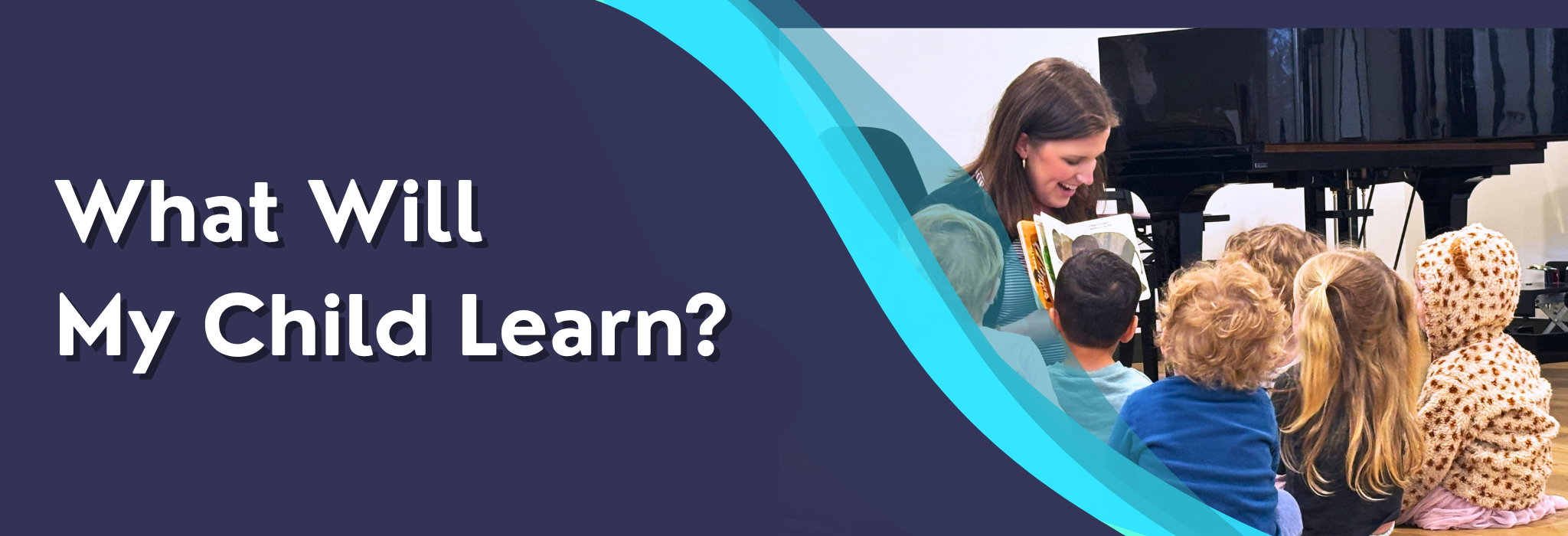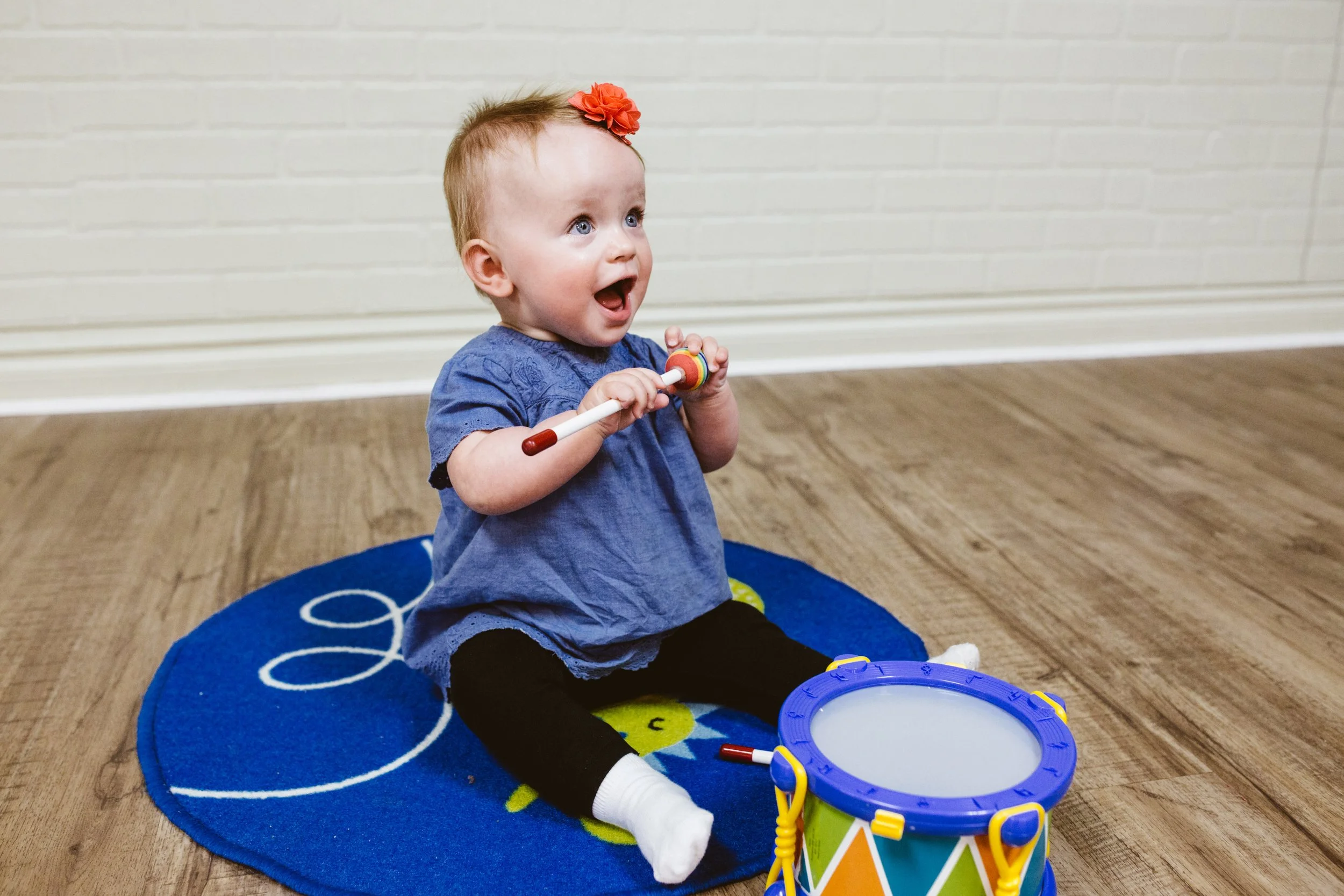We Build a Lifelong Foundation in Music - But That’s Just the Beginning
At Music Kids we witness the pure joy that music brings to babies and children, and we know its impact runs deep. Music supports healthy brain development, strengthens emotional regulation and offers a powerful outlet for self-expression. But perhaps most beautifully, we love how music nurtures the bond between children and their caregivers, fostering connections, trust and joy.
Through music, we help children grow not just as musicians, but as confident, connected and expressive individuals. That’s the heart of what we do and why we love it.
Why start music lessons in infancy?
Accelerates Brain Development: Studies show that music engages areas of the brain linked to language, memory, and spatial reasoning - key foundations for future learning.
Fosters Early Language Skills. Infants exposed to music show improved listening, sound discrimination, and pre-verbal communication, all critical to early speech and literacy.
Promotes Emotional Regulation. Music activates the brain’s limbic system, which processes emotion, and supports the development of neural pathways involved in self-regulation.
Encourages Social Development. Group classes teach turn-taking, cooperation, and empathy - essential building blocks for healthy peer interactions.
Cultivates Creativity and Imagination. Music making sparks curiousity, problem-solving and supports innovative thinking.
Strengthens Parent-Child Bonds. Parents and children learn activities and repertoire together creating meaningful shared experiences that forever enrich and enhance their lives.
6 – 24 Month olds
(with parental guidance)
Enjoy a warm and nurturing introduction into the world of music in our 6-24 month old classes where smiles, connection and curiosity thrive. Key areas of development at this stage include:
Language Acquisition. Singing and rhythmic play stimulate the same neural pathways used for language development, enhancing phonemic awareness, auditory memory and early speech processing - all essential for language and literacy development.
Motor Skill Development. Movement based activities paired with instrument play help develop both fine and gross motor skills, supporting physical and spatial awareness.
Instrument Discovery. Children explore a wide range of age appropriate instruments such as chiquitas, drums, bells and more which stimulate tactile learning, auditory discrimination and hand-eye coordination.
Socialization. A playful group setting encourages parallel play, imitation, and awareness of others, fostering the earliest stages of social interaction and cooperation.
Auditory Processing. Exposure to patterns in music enhances the brain’s ability to process, differentiate and respond to sounds laying the foundation for listening skills and cognitive growth.
Secure Attachment. Shared musical experiences between a caregiver and child foster a sense of safety, trust and emotional attunement - a foundation for emotional well-being and healthy relationships.
2 Year olds
(moving away from parental guidance)
Experience a lively class where toddlers experience the joy of music through song, movement and instrument play. Here are some of the key areas of development cultivated at this stage:
Musical Foundation. Children learn primary musical concepts such as tempo (fast/slow), dynamics (loud/soft), pitch awareness (high/low) through engaging songs and instrument activities.
Emerging Independence. Toddlers learn to follow cues from the teacher enhancing their ability to participate without direct parental involvement.
Instrument Exploration. New instruments such as the xylophone, bongos and clackers are introduced allowing children to experiment with different sounds and rhythms.
Motor Skill Development. Fine and gross motor skills are enhanced through activities involving movement and mallet coordination, improving coordination and control.
Developmental Milestones. Through musical games and activities, children practice identifying colours, learning numbers, counting and developing skills in taking turns and sharing.
Emotional Regulation. Engaging in musical activities helps toddlers develop emotional regulation by activating brain regions involved in emotion processing such as the amygdala and prefrontal cortex.
3 - 4 Year olds
(parent free class)
Young musicians learn fundamental music concepts and social independence in our preschool music classes. Key elements include:
Social independence. This is the first class that caregivers are no longer present, allowing children to build confidence, autonomy and comfort in a group learning environment.
Rhythmic Literacy. Through a variety of instruments, children learn to recognize and create rhythms both visually and aurally.
Singing. Developing the singing voice is a central focus at this age. Children begin matching pitch, exploring vocal range and using their voices expressively and musically.
Movement and Gross Motor Integration. Children learn best through movement. Body percussion, action songs and movement games support coordination, body awareness and internalization of musical concepts.
Ear Training. Learning songs strengthens listening skills and helps develop the musical ear.
Musical Vocabulary. Young musicians expand their knowledge of musical symbols and terminology, building a foundation of musical literacy.
Conducting and Ensemble Play. Children are introduced to the role of a conductor while playing a variety of instruments such as drums and bells, learning to collaborate and play as an ensemble.
Creative Expression and Emotional Development. Children express themselves creatively, and are encouraged to communicate their feelings in a supportive setting.
4-5 Year olds
(parent free class)
Our preschool music classes support young children in developing early musicianship skills and building a strong musical foundation. Skills cultivated include:
Note Reading. Children are introduced to reading music starting with the C major scale using note names and solfege.
Musicianship Development. Through songs, clapping and instrument play, children explore melody, rhythm, dynamics, tempo and form, building comprehensive musicianship skills.
Instruments of the Orchestra. Children learn about the various instruments of the orchestra and the unique sounds they produce.
Composer Exploration. Children discover the lives and music of the great composers as well as contemporary songwriters and musicians.
Music Composition. With guidance, children explore simple notation and composition through instrument play, handbells and storytelling activities laying the groundwork for original musical expression.
Preparation for Private Music Instruction. Young musicians learn foundational concepts in preparation for private music lessons on the instrument of their choice.
Music Kids Private Lessons
(ages 4+)
Music Kids private lessons combine the fundamentals of early music study with the engaging, play-based approach of the Music Kids curriculum. Designed for pre-reading children who are ready to try a private instruction without the necessity of a home practice routine. These lessons offer a joyful introduction to private music study.
Pre-requisite: Children must be a minimum of 4 years of age. Younger children may be accepted with instructor approval.
Individualized Learning Pace. Lessons are tailored to each child’s developmental stage and learning style.
Independence. Children gain confidence in a supportive one-on-one learning environment.
Student Led Exploration. Lessons are tailored to each child’s interests, incorporating a variety of songs, instruments and activities to introduce core musical concepts.
Fundamental Skills. Students begin learning note reading, rhythms, performance etiquette and more.
Music Literacy. Through singing, piano, drums and movement, children develop their understanding of notation, rhythm, musical symbols in a multi-sensory format.
Pathway to Private Lessons. Young musicians discover their musical interests allowing parents insight into which instrument is best suited for their child's future musical studies.



